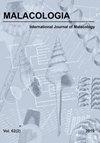血淋巴提取的微创DNA采样最大限度地降低了淡水贻贝的风险:濒危的菲律宾海鳗(Unio crassus Philipsson),1788年(双壳目:海鳗科)
IF 1
4区 生物学
Q4 ZOOLOGY
引用次数: 0
摘要
濒危物种研究对物种保护具有重要意义。一些保护研究需要组织或液体,以便获得分子数据。因此,对濒危物种DNA采样方法的需求日益增加,以尽量减少对活体动物的伤害。这尤其关系到那些受到高度威胁和保护的淡水贻贝,如厚壳河贻贝。在德国进行两种不同的野外实验,在自然条件下,对从足部组织中提取血淋巴后的红鹤的短期和长期存活率进行了评估。我们在壳长超过40毫米和年龄大于5岁的个体中没有发现负面影响。我们也在治疗后对一些人进行了长达三年的随访,没有发现对这些人有任何伤害。DNA质量高,完全适合单基因测序(COI)和微卫星分析。本文章由计算机程序翻译,如有差异,请以英文原文为准。
Minimally Invasive DNA Sampling by Hemolymph Extraction Minimizes Risk to Freshwater Mussels: The Case of Endangered Unio crassus Philipsson, 1788 (Bivalvia: Unionidae)
ABSTRACT Research on endangered species is important for species conservation. Some lines of conservation research require tissue or fluids so that molecular data can be obtained. Thus, there is an increasing demand for methods of DNA sampling in endangered species that minimize harm to live animals. This especially concerns such highly threatened and protected freshwater mussels as the thick-shelled river mussel Unio crassus. With two different field experiments in Germany under natural conditions, the short- and long-term survival of Unio crassus after hemolymph extraction from the foot tissue was evaluated. We detected no negative effects in individuals of over 40 mm shell length and older than five years. We also followed some individuals for up to three years after treatment and detected no harm to these individuals. DNA quality was high and proved fully suitable for single-gene sequencing (COI) and microsatellite analyses.
求助全文
通过发布文献求助,成功后即可免费获取论文全文。
去求助
来源期刊

Malacologia
生物-动物学
CiteScore
2.00
自引率
0.00%
发文量
15
审稿时长
3 months
期刊介绍:
Malacologia publishes papers on all groups of the Mollusca. Malacologia specializes in publishing long papers and monographic treatments. Complete data are especially appreciated. Papers must be of interest to an international readership. Papers in systematics, ecology, population ecology, genetics, molecular genetics, evolution and phylogenetic treatments are especially welcomed. Also welcomed are letters to the editor involving papers published or issues of import to science of the day.
 求助内容:
求助内容: 应助结果提醒方式:
应助结果提醒方式:


